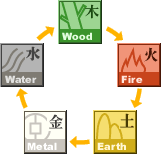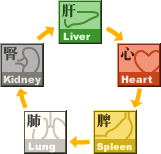Questions about Taking Chinese Herbs
Q : How does TCM apply the Five Element Theory in tonifying or reducing therapies?
A: According to the Five Elements Theory, all things can be divided into five elements (metal, wood, water, fire and earth). Our body's five yin organs (heart, liver, spleen, lung and kidney) correspond to the five elements based on their biological special natures.
TCM makes use of these relationships to treat diseases of the organs in tonifying or reducing therapies.
 |
 |
Figure 1.
This cycle shows how the five elements produce one another |
Figure 2.
This cycle shows how the five organs promote one another |
Index:  Generates Generates |
In case of deficiency syndromes, besides tonifying the deficient organ, it is necessary to tonify its counter-generation partner in order to speed up the recovery. For example, in treating liver (wood) deficiency, water generates wood, so physicians will also tonify the kidney (water) to reinforce treatment.
In case of excess syndromes, besides reducing the particular organ, it is also necessary to reduce its generation partner in order to depress the excitatory conditions. For example, in treating excessive fire in the liver (wood), wood generates fire, so physicians will also reduce the heart (fire) so as to relieve the excessive fire indirectly.
Q : What is the most common form of Chinese medicine?
A: The most common form is liquid decoction. Chinese herbal decoctions are characterized by their quick absorption, favorable therapeutic outcomes and minimal toxic side effects. The ingredients in the decoctions can be modified, increased or decreased on a daily basis, allowing physicians to tailor to the patient's changing conditions and needs. Flexibility is one of the main reasons why this method is still being used after thousands of years.
Q : What is the proper way to make a herbal decoction?
A: Just like cooking, it is important to follow the proper steps. Incorrect preparation may impact on the intended effects.
A ceramic clay or crockery pot with a lid works best; however, an enamel or glass pot can also be used. Iron, aluminium and copper pots should be avoided because chemical interaction can occur and affect the original nature of the ingredients.
Uncontaminated cool water is best. Physicians may recommend using rice wine or a combination of water and wine for certain types of decoctions.
Add water until the herbs are lightly submerged; soak for 20-30 minutes so the effective contents can be easily extracted when boiled. Bring to a boil quickly and then turn the heat down as required for the time given.
The specific time and heat used in preparing your decoction are determined by the properties and nature of the ingredients. Generally, cold and flu or purgative decoctions are boiled on high heat for 20-30 minutes. Tonic or other decoctions that contain rich sticky substances are decocted for a longer time (approximately one hour) with mild heat and more water. In order to achieve the best results, your physician should clarify what type of decoction you are preparing, the appropriate amount of water that should be used and how long it should be boiled.
The herbal compounds and the liquids are commonly boiled down to one glass or 250ml. Then it should be filtered into a container while straining the dregs. If the decocted herbal ingredients are overheated or burnt, the whole decoction should be discarded because damaged ingredients can produce undesirable effects.
Certain ingredients must be treated differently due to their special properties. If they are in your prescription, the ingredients are usually packed separately. For example, shells and minerals have to be smashed and decocted first; volatile and aromatic substances like peppermint and Amomum fruits are added near the end and are cooked for 5 minutes only. Substances like Biond Magnolia flower and Plantain seed must be wrapped in gauze, because they make the decoction turbid or irritate the throat. Expensive substances such as deer horn and ginseng are sliced and boiled separately, so that their active ingredients are not affected by other herbs. Their decoctions can either be taken together with other decoctions or drunk separately. Some colloid ingredients like honey or malt sugar should be melted into the warm finished decoction directly. Some rare aromatic substances like musk are ground into powder and taken with a decoction or lukewarm water.
If preparing your own decoction seems like a daunting task, many herbal shops and physicians can provide this service when asked.
Q : Can Chinese medicine be boiled twice?
A: Sometimes the same set of ingredients can be boiled twice. When decocting for a second time, less water (approximately 500ml) is used or just enough to cover the surface of the ingredients. The two glasses of liquid that are obtained from both procedures are then mixed together; consume one in the morning and the other in the evening.
Medicinal materials that have a strong flavor and those with tonifying effect can usually be re-boiled. In order to extract most of the active ingredients, it is suggested to scoop out the medicinal residues and wrap them with a piece cloth and squeeze out the liquid, so as to fully utilize the active ingredients and not to let them get to waste. Medicine for treating influenza, for example, is not suitable for re-boiling. This is because the active ingredients of this medicine like peppermint and Amomum fruits can easily evaporate. If you "over cook" your decoction, it is best not to drink it as the chemical nature of the medicine has probably been altered.
Q : Can you explain what toxicity in Chinese Medicine means?
A: Traditionally, Chinese medicines are divided into three categories: those with heavy toxicity, minor toxicity and no toxicity. According to Chinese medicinal pharmacology, serious toxic effects are coma, nausea, numbness in the mouth and in the limbs, which can be easily induced by drugs such as dried toad venom, unprocessed croton fruits and cinnabar. Medicines with minor toxicity like apricot seeds and ginkgo nuts, if used in high dosages, can cause mild breathing difficulties, abnormal heartbeat and dizziness. Drugs without toxicity, i.e., commonly used ingredients, are mild in nature and are less likely to have side effects. However, most TCMs are safe if applied according to syndrome differentiation and with the correct dosage for the appropriate length of time.
Q : Can TCM be used incorrectly?
A: The most outstanding characteristic of TCM is diagnosis and treatment based on Syndrome differentiation. When the syndrome of a specific disease is determined, the appropriate medicine will be prescribed. For example, in the treatment of gastroptosis (abnormal drooping of the stomach), drugs that have elevation properties would be used and drugs that have a descending effect would be avoided. If the body's constitution and the nature of disease are not clearly understood and medicine is applied randomly, the disease may be aggravated or lead to other health problems. Some Chinese medicines are extremely strong and contain toxic ingredients. If the dosage is inappropriate or consumed incorrectly by mistake, it could lead to poisoning and even death. The Chinese Medicine Council of Hong Kong declared in 1996 that there are 31 types of potent/toxic Chinese herbal medicines. Always obtain prescriptions from a registered TCM doctor and follow their advice regarding preparation. If poisoning occurs, seek medical help as soon as possible.
Q : What is the best way to choose a proprietary Chinese medicine?
A: When choosing a proprietary Chinese medicine, it is important that the chosen medicine is suitable for your particular health need, so one should always read the label carefully. In addition, although different medicines contain the same herbal ingredients, one should always buy a product made by a reputable manufacturer. As preparation of Chinese herbal products rely on special skills, a difference in manufacturing can have subtle differences in effects. The best way is to seek advice from medical professionals or the manufacturers of the medicine before taking the medicine. (See "The effect of dual modulation")
Q : Can Chinese medicine and western medicine be taken together?
A: Both TCM doctors and western medical doctors think that western drugs and Chinese medicines should not be taken simultaneously. The reason is that some chemical elements in Chinese medicines may react with western drugs. Using the two together also may affect the efficacy of both medicines and their interaction may produce toxic effects which could endanger health. One should leave around a 4-hour gap between taking these different kinds of medicines. Ideally, the individual should first consult a medical practitioner before taking any medicine.
Q : Does TCM have standardized dosages?
A: Physicians will generally consider the recommended dosage listed in pharmacopoeia during their consultations. However, due to variations in the quality of herbs as well as a person's individual condition, physicians tend to vary somewhat from the recommended dosage. The Hong Kong Department of Health, in conjunction with The Chinese University of Hong Kong and Hong Kong Baptist University, has developed standards for commonly used herbs.
References:
Chinese Pharmaceutics
Chinese Pharmaceutics Identification
Published by Shanghai Science and Technology Publishing House, 6th edition.
Written by:
CM Promotion Group - School of Chinese Medicine, CUHK.
Translated and Edited by:
Jennifer Eagleton, BA, MA (Asian Studies), Integrated Chinese Medicine Holdings Ltd.
Lawrence Lau, Ph.D., Integrated Chinese Medicine Holdings Ltd.
Rose Tse, Integrated Chinese Medicine Holdings Ltd.
|